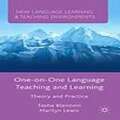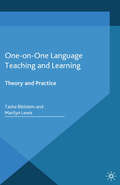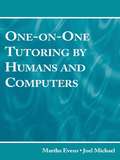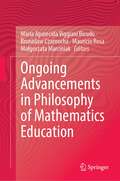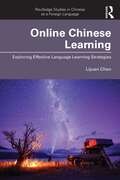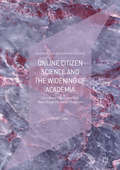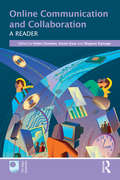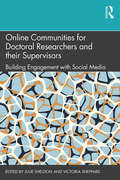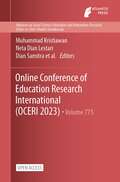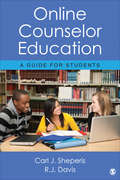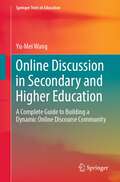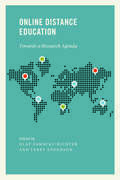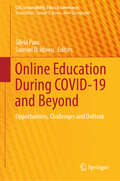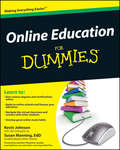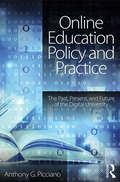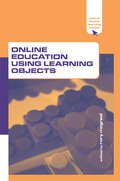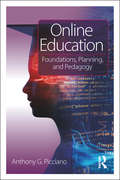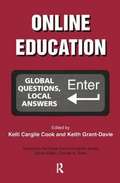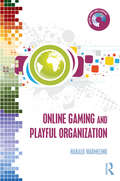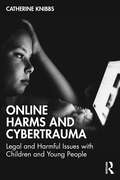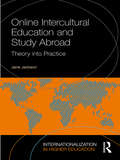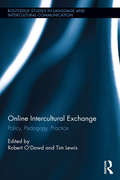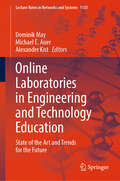- Table View
- List View
One-Year Bible Reading Plan
by Rose Publishing"[God's] Word is word is a lamp for my feet and a light on my path" (Psalm 119:105 NIV) - but without a plan, it's easy to lose your way when reading through the Bible. This handy eBook shows you three different options for reading through the Bible in 52 weeks. Options include reading the Bible from beginning to end, reading the Old and New Testament together, and daily readings from seven different sections of the Bible for each day of the week.
One-on-One Language Teaching and Learning
by Tasha Bleistein Marilyn LewisWith only one learner, it is possible for the teacher to give serious attention to principles of second language acquisition such as motivation, error treatment, and learner autonomy, which are more difficult to address in classroom learning. This book combines theory with practical suggestions, making it invaluable for language tutors.
One-on-One Language Teaching and Learning: Theory and Practice (New Language Learning and Teaching Environments)
by T. Bleistein M. LewisWith only one learner, it is possible for the teacher to give serious attention to principles of second language acquisition such as motivation, error treatment, and learner autonomy, which are more difficult to address in classroom learning. This book combines theory with practical suggestions, making it invaluable for language tutors.
One-on-One Tutoring by Humans and Computers
by Joel Michael Martha EvensOne-on-One Tutoring by Humans and Computers articulates the CIRCSIM-Tutor project, an attempt to develop a computer tutor that generates a natural language dialogue with a student. Editors Martha Evens and Joel Michael present the educational context within which the project was launched, as well as research into tutoring, the process of implementation of CIRCSIM-Tutor, and the results of using CIRCSIM-Tutor in the classroom. The domain of this project is cardiovascular physiology, specifically targeting first-year medical students, though the idea is applicable to the development of intelligent tutoring systems across populations, disciplines, and domains. This 5 year-long project was motivated by the belief that students need assistance in building appropriate mental models of complex physiological phenomena, as well as practice in expressing these ideas in their own words to fully develop those models, and experience in problem-solving to use those models effectively. The book outlines directions for future research, and includes distinct features such as:*detailed studies of human one-on-one tutoring;*learning outcomes resulting from use of the tutor;*natural language input parsed and translated into logical form; and*natural language output generated using the LFG paradigm. This volume will appeal to educators who want to improve human tutoring or use computer tutors in the classroom, and it will interest computer scientists who want to build those computer tutors, as well as anyone who believes that language is central to teaching and learning.
Ongoing Advancements in Philosophy of Mathematics Education
by Bronislaw Czarnocha Maria Aparecida Viggiani Bicudo Maurício Rosa Małgorzata MarciniakOngoing Advancements in Philosophy of Mathematics Education approaches the philosophy of mathematics education in a forward movement, analyzing, reflecting, and proposing significant contemporary themes in the field of mathematics education. The theme that gives life to the book is philosophy of mathematics education understood as arising from the intertwining between philosophy of mathematics and philosophy of education which, through constant analytical and reflective work regarding teaching and learning practices in mathematics, is materialized in its own discipline, philosophy of mathematics education. This is the field of investigation of the chapters in the book. The chapters are written by an international cohort of authors, from a variety of countries, regions, and continents. Some of these authors work with philosophical and psychological foundations traditionally accepted by Western civilization. Others expose theoretical foundations based on a new vision and comprising innovative approaches to historical and present-day issues in educational philosophy. The final third of the book is devoted to these unique and innovative research stances towards important and change resistant societal topics such as racism, technology gaps, or the promotion of creativity in the field of mathematics education.
Online Chinese Learning: Exploring Effective Language Learning Strategies (Routledge Studies in Chinese as a Foreign Language)
by Lijuan ChenOnline Chinese Learning aims to investigate the types of language learning strategies (LLSs) that online Chinese learners use across asynchronous and synchronous learning environments in different learning contexts.This book examines how the use of language learning strategies by online Chinese learners is influenced by the interactants; the characteristics of the specific learning context; and selected individual learner characteristics. This book will provide: (1) new and detailed information about students’ LLS use in online Chinese learning; (2) insights into how individual students adopt LLSs and technological tools to solve learning problems in various learning contexts; (3) an exploration of factors influencing LLS use; and (4) recommendations regarding LLS adoption, use, and training.This book will be a valuable resource for university instructors in languages, language teaching methods, and second language acquisition, as well as researchers in languages, linguistics, and language learning and teaching.
Online Citizen Science and the Widening of Academia: Distributed Engagement With Research And Knowledge Production (Palgrave Studies In Alternative Education Ser.)
by Vickie CurtisThis book examines the increasing popularity of online citizen science projects arising from developments in ICT and rapid improvements in data storage and generation. As these new technologies allow for much higher levels of participation, collaboration and interaction, the author explores what online citizen science projects reveal about the ‘democratisation’ of science and distributed engagement with authentic research. Analysing the wider appeal of these projects as well as their potential for informal science learning and creating communities of practice, this book asks whether ‘citizen’ and ‘researcher’ will ever be on equal footing. Drawn from years of mixed-methods research, this volume sheds light on this under-researched subject area despite its recent growth and enormous potential. It is sure to be of interest to students and scholars of democratised knowledge, citizen science and online learning, as well as those already involved in citizen science.
Online Communication and Collaboration: A Reader
by Magnus Ramage Helen Donelan Karen KearCommunication and collaboration via the Internet has risen to great prominence in recent years, especially with the rise of social networking, Web 2.0 and virtual worlds. Many interesting and worthwhile studies have been conducted on the technology involved and the way it is used and shaped by its user communities. From some of the more popular coverage of these interactions, it might be thought that these are new phenomena. However, they draw on a rich heritage of technologies and interactions. Online communication and collaboration presents a very timely set of articles that cover a range of different perspectives upon these themes, both classic and contemporary. It is unusually broad in the range of technologies it considers - many books on these topics cover only a few forms of collaboration technology - and in considering well-established technologies as well as recent ones. It blends academic and popular articles to combine scholarly rigour with readability. The book is divided into eight sections, covering the foundations of online communication and collaboration, together with current collaboration technologies such as wikis, instant messaging, virtual worlds and social network sites. These modern communication tools are considered in terms of their interactions but also looking back at lessons to be learnt from their technological 'ancestors'. The book also contains an extended case study of online collaboration, taking open-source software as its example. Online communication and collaboration will be of relevance in a wide range of higher education courses in fields related to soft computing, information systems, cultural and media studies, and communications theory.
Online Communities for Doctoral Researchers and their Supervisors: Building Engagement with Social Media
by Julie SheldonBringing together accounts of online community engagement from a range of perspectives, this book considers how the changing landscape of doctoral communities might be used to inform institutional level decisions about doctoral provision and support. Despite the increasing availability of online communities dedicated to doctoral supervisors, there has been little consideration of how they form and operate. This book surveys the landscape of these online communities and examines their impact on the production of the doctorate, and on the experience of doctoral researchers and supervisors. Bringing together accounts of online community engagement from a range of perspectives – doctoral students, supervisors, content curators, and research support practitioners, one of the overarching aims of this volume is to explore these communities in action. With the supporting doctoral research through online media catalysed as the ‘new normal’, this book allows stakeholders in doctoral education to better understand how students are using social media in their PhD studies, how online communities of practice impact upon researcher/supervisor relationships and support, and ways in which student experiences of various platforms might converge to create an augmented experience.
Online Conference of Education Research International (Advances in Social Science, Education and Humanities Research #775)
by Muhammad Kristiawan Neta Dian Lestari Dian Samitra Zico Fakhrur Rozi Muhammad Nikman Naser Reva Maria Valianti Muthmainnah Muthmainnah Badeni Badeni Fitri April Yanti Dina Apryani Okky Leo Agusta Jumiati Siska Elsa Viona Elce Purwandari Reny Dwi RiastutiThis is an open access book. Online Conference of Education Research International (Batch 1) is an annual international seminar organized by Doctor of Education Study Program, the Faculty of Teacher Training and Education, Universitas Bengkulu which aims to explore new direction of interdisciplinary knowledge and technology to the most influential ideas and innovations in education and research.This is an open access book.
Online Counselor Education: A Guide for Students
by Carl J. Sheperis R. J. DavisOnline Counselor Education: A Guide for Students is an all-new guide for online students in counselor education programs. Students in online environments face a number of challenges that could put them at a disadvantage unless they have a resource to help guide them through some of the confusing aspects of an online environment. Such challenges include the lack of understanding surrounding graduate school performance expectations, balancing graduate school and life, the inability to connect with community members and local field agencies, and various other aspects unique to an online environment. This text will help students through these challenges and act as an invaluable resource.
Online Counselor Education: A Guide for Students
by Carl J. Sheperis R. J. DavisOnline Counselor Education: A Guide for Students is an all-new guide for online students in counselor education programs. Students in online environments face a number of challenges that could put them at a disadvantage unless they have a resource to help guide them through some of the confusing aspects of an online environment. Such challenges include the lack of understanding surrounding graduate school performance expectations, balancing graduate school and life, the inability to connect with community members and local field agencies, and various other aspects unique to an online environment. This text will help students through these challenges and act as an invaluable resource.
Online Discussion in Secondary and Higher Education: A Complete Guide to Building a Dynamic Online Discourse Community (Springer Texts in Education)
by Yu-Mei WangThis textbook covers the essentials for successfully conducting online discussions in various course delivery formats, such as online, face-to-face, and blended. Readers will learn how to design online discussions to cognitively engage students, build meaningful discourse communities to promote group dynamics, apply just-in-time facilitation strategies to deepen student learning and utilize robust assessment to ensure learning objectives are achieved. Online discussion is the lifeline of online learning and it is a pedagogical imperative that instructors have requisite skills in leading online discussions if they are to teach online courses. Leading the online discussion is a huge task, involving a complex process and professionals must master a range of skills to successfully lead online discussion. This book takes a comprehensive and systematic approach to this topic and helps teachers to utilize online discussion to maximize student learning. It is full of ideas and strategies that can be applied immediately in various teaching contexts, and practitioners can replicate examples in teaching practices or mold the ideas and strategies to fit particular teaching contexts. This textbook appeals to readers with knowledge and skills at various levels. Those who are new to online discussion will appreciate the step-by-step guidance, whereas readers with some experience can pick up skills they need. This flexibility contributes to the ultimate goal of the book – unleashing the potential of online discussion to benefit student academic learning.
Online Distance Education: Towards a Research Agenda
by Terry Anderson Olaf Zawacki-RichterOnline Distance Education: Towards a Research Agenda provides a systematic overview of the major issues, trends, and areas of priority in online distance education research. In each chapter an international expert or team of experts provides an overview of one relevant issue in online distance education, discussing theoretical insights that guide the research, summarizing major research on the topic, posing questions and directions for future research, and discussing the implications for distance education practice as a whole. Intended as a primary reference and guide for distance educators, researchers, and policymakers, Online Distance Education takes care to address aspects of distance education practice that until now have often been marginalized, including issues of cost and economics, social justice implications, cultural impacts, faculty professional development, and the management and growth of learner communities. At once soundly empirical and thoughtfully reflective, yet also forward-looking and open to new approaches to online and distance teaching, this text is a solid resource for researchers in a rapidly expanding discipline.
Online Education During COVID-19 and Beyond: Opportunities, Challenges and Outlook (CSR, Sustainability, Ethics & Governance)
by Samuel O. Idowu Silvia PuiuThis book aims to provide sustainable solutions for better understanding and management of online education in different parts of the world. In this context, it explores the attitudes and perceptions of stakeholders, such as students, faculty, and other actors on issues related to online education. In particular, it examines the challenges they have faced over the years when online courses were introduced due to the COVID-19 pandemic. A model is proposed that includes five variables: specific communication issues in online education, the ability of professors to offer online courses, the quality of online education, students' perceived stress during online education, and the technical requirements of online education.The book will be of interest to anyone concerned with the new and future ways of teaching and learning.Chapter “When a Phenomenon-Based University Course Went Online: Students’ Experiences and Reflections After Sauna Bathing” is available open access under a Creative Commons Attribution 4.0 International License via link.springer.com.
Online Education For Dummies
by Susan Manning Kevin E. Johnson Jonathan E. FinkelsteinFrom admission to graduation-your personal guide to studying onlineOnline Education For Dummies explains the ins and outs of attending a virtual classroom, and provides you with the tools you need to hone your skills or obtain additional certification and degrees. This practical reference not only helps you get the most out of an online course, but also offers a wealth of advice to help you pick the one that matches your interests and needs.Identifies the software and hardware needed to study onlineReveals how to get financial aid, transfer credits, and manage online timeExplains how to locate legitimate online programs and avoid scamsWhether you want to earn a degree or just increase your knowledge through an online course, Online Education For Dummies is the only guide you need.
Online Education Policy and Practice: The Past, Present, and Future of the Digital University
by Anthony G. PiccianoOnline Education Policy and Practice examines the past, present, and future of networked learning environments and the changing role of faculty within them. As digital technologies in higher education increasingly enable blended classrooms, collaborative assignments, and wider student access, an understanding of the creation and ongoing developments of these platforms is needed more than ever. By investigating the history of online education, the rise and critique of MOOCs, the mainstreaming of social media, mobile devices, gaming in instruction, and more, this expansive book outlines a variety of potential scenarios likely to become realities in higher education over the next decade.
Online Education Using Learning Objects (Open and Flexible Learning Series)
by Rory McGreal'E-learning is integral to on-site education institutions worldwide, and the rapid explosion of interest in the subject means that this timely, cutting-edge book will be an instant and indispensable resource. Among educators, the development of reusable learning objects made accessible via the internet is ever more important to teaching and learning. This book provides a comprehensive look at a state-of-the-art online education, and presents advice on the creation, adaptation and implementation of learning objects and metadata. Including articles written by some of the leading innovators in the field, this book takes the reader through: designing effective learning objects; creating learning objects; transforming existing content into reusable learning objects; building a metadata management system. This book will be essential reference material for learning technologists, course developers at learning institutions, postgraduate students, teachers and learners in the field of e-learning.'
Online Education: Foundations, Planning, and Pedagogy
by Anthony G. Picciano<i>Online Education</i> is a comprehensive exploration of blended and fully online teaching platforms, addressing history, theory, research, planning, and practice. As colleges, universities, and schools around the world adopt large-scale technologies and traditional class models shift into seamless, digitally interactive environments, critical insights are needed into the implications for administration and pedagogy. Written by a major contributor to the field, this book contextualizes online education in the past and present before analyzing its fundamental changes to instruction, program integration, social interaction, content construction, networked media, policy, and more. A provocative concluding chapter speculates on the future of education as the sector becomes increasingly dependent on learning technologies.
Online Education: Global Questions, Local Answers
by Kelli Cargile Cook Keith Grant-Davie24 college educators focus on the most important questions to be addressed by all scholar-teachers and administrators committed to developing high-quality online education programs. The educators describe these questions as "global" because they transcend the particular situations of individual institutions. They are questions that everyone in online education needs to address: What are the issues to consider when first developing and then sustaining an online education program? How do we create interactive, pedagogically sound online courses and classroom communities? How should we monitor and assess the quality of online courses and programs? How should recent developments and innovations in online education cause us to reexamine our roles and responsibilities as educators in technical communication? While these questions affect all of us, they demand different local answers, such as those presented by the contributors to this textbook.
Online Gaming and Playful Organization (Digital Games, Simulations, and Learning)
by Harald WarmelinkOnline Gaming and Playful Organization explores the cultural impact of gaming on organizations. While gaming is typically a form of entertainment, this book argues that gaming communities can function as a useful analogue for work organizations because both are comprised of diverse members who must communicate and collaborate to solve complex problems. By examining the impact of gaming beyond its own context, this book argues that one can apply numerous lessons from the virtual world of online games to the “real” world of businesses, schools, and other professional communities. Most notably, it articulates the concept of playful organizations, defined as organizations in which the ability to play has become so institutionalized that it is spontaneous, creative, and enjoyable. Based on original research, Online Gaming and Playful Organization establishes an interdisciplinary framework for further conceptual and empirical investigation into this topic, with the dual goals of a better understanding of the role of online games and virtual worlds, and of the possible structural and cultural transformation of public and private organizations.
Online Harms and Cybertrauma: Legal and Harmful Issues with Children and Young People
by Catherine KnibbsThis vital, sensitive guide explains the serious issues children face online and how they are impacted by them on a developmental, neurological, social, mental health and wellbeing level. Covering technologies used by children aged two through to adulthood, it offers parents and professionals clear, evidence-based information about online harms and their effects and what they can do to support their child should they see, hear or bear witness to these events online. Catherine Knibbs, specialist advisor in the field, explains the issues involved when using online platforms and devices in family, social and educational settings. Examined in as non-traumatising a way as possible, the book covers key topics including cyberbullying; cyberstalking; pornography; online grooming; sexting; live streaming; vigilantism; suicide and self-harm; trolling and e-harassment; bantz, doxing and social media hacking; dares, trends and life-threatening activities; information and misinformation; and psychological games. It also explores the complex overlap of offline and online worlds in children and young people’s lives. Offering guidance and proactive and reactive strategies based in neuroscience and child development, it reveals how e-safety is not one size fits all and must consider individual children’s and families’ vulnerabilities. Online Harms and Cybertrauma will equip professionals and parents with the knowledge to support their work and direct conversations about the online harms that children and young people face. It is essential reading for those training and working with children in psychological, educational and social work contexts, as well as parents, policy makers and those involved in development of online technologies.
Online Intercultural Education and Study Abroad: Theory into Practice (Internationalization in Higher Education Series)
by Jane JacksonWith the increasing focus on international education and study abroad programmes, Online Intercultural Education and Study Abroad meets the need for a text that addresses ways in which technology may be harnessed to enhance student experience. Combining case studies with theoretical insights, this book critically investigates the effectiveness of a fully online study abroad intervention that was designed to optimise intercultural learning in an international context. Intercultural education researchers and practitioners are provided with theory-based practical ideas such as eLearning strategies and online mentoring tips to help students maximise their intercultural education journey, intercultural competence development, and social engagement while abroad. Both practical and research-focused, this volume considers a wide range of topics, including: Contemporary notions of experiential learning Guided critical reflection through e-mentoring A social contructivist orientation towards eLearning pedgagogy Tools to help understand and measure learner development abroad Online Intercultural Education and Study Abroad is suitable for both novice and experienced study abroad practitioners, researchers, and administrators. Satisfying the growing interest in using eLearning within study abroad programmes, this book will be a necessary point of reference for any institution that aims to enhance international educational experience, especially through the use of technology.
Online Intercultural Exchange: Policy, Pedagogy, Practice (Routledge Studies in Language and Intercultural Communication #15)
by Tim Lewis Robert O'DowdThis volume provides a state of the art overview of Online Intercultural Exchange (OIE) in university education and demonstrates how educators can use OIE to address current challenges in university contexts such as internationalisation, virtual mobility and intercultural foreign language education. Since the 1990s, educators have been using virtual interaction to bring their classes into contact with geographically distant partner classes to create opportunities for authentic communication, meaningful collaboration and first-hand experience of working and learning with partners from other cultural backgrounds. Online exchange projects of this nature can contribute to the development of learner autonomy, linguistic accuracy, intercultural awareness, intercultural skills and electronic literacies. Online Intercultural Exchange has now reached a stage where it is moving beyond individual classroom initiatives and is assuming a role as a major tool for internationalization, intercultural development and virtual mobility in universities around the globe. This volume reports qualitative and quantitative findings on the impact of OIE on universities in Europe and elsewhere and offers comprehensive guidance on using OIE at both pedagogical and technological levels. It provides theoretically-informed accounts of Online Intercultural Exchanges which will relevant to researchers in Computer Assisted Language Learning, Computer-Mediated Communication, or Virtual Education. Finally, contributors offer a collection of practitioner-authored and practically-oriented case studies for the benefit of teachers of foreign languages or in other subject areas who wish to engage in developing the digital literacy and intercultural competences of their learners.
Online Laboratories in Engineering and Technology Education: State of the Art and Trends for the Future (Lecture Notes in Networks and Systems #1135)
by Michael E. Auer Dominik May Alexander KistThis comprehensive book, divided into seven sections, showcases groundbreaking research findings that blend new experiences from the COVID-19 pandemic with long-term research on online laboratories and virtual experimentation. Providing an adequate learning experience in the laboratory has long been a major challenge in science, engineering, and technology education. Recent years have further revealed the complexities of offering distance or remotely accessible educational settings, particularly for laboratory-based courses. In response, many academic institutions have innovated by transitioning their laboratory classes into online laboratories or providing laboratory kits for at-home use. This unprecedented situation has sparked numerous new developments, approaches, and activities, revolutionizing the field. With contributions from leading researchers and practitioners across diverse disciplines, this book delves into current trends, addresses critical challenges, and uncovers future opportunities for laboratory-based education in the context of online learning. Whether readers are educators seeking innovative teaching strategies, researchers exploring the latest advancements, or academic leaders looking to enhance remote learning experiences, this book provides valuable insights and practical solutions. It explores how online laboratories are transforming education and discovers the potential they hold for the future.

